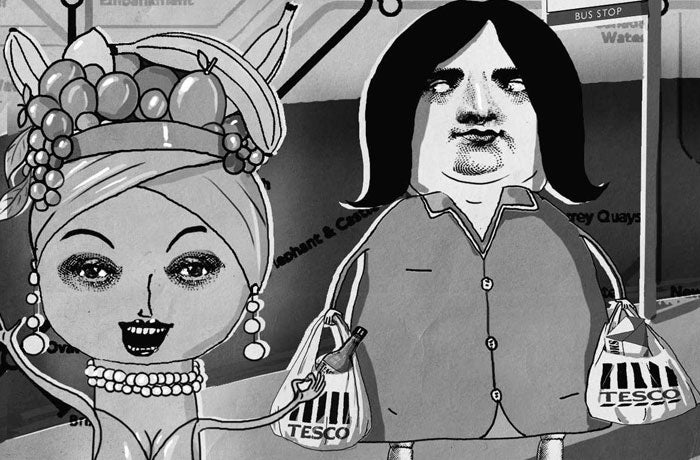Boyd Tonkin: 'With every shake of the maracas, the Carnaval shows how the capital has evolved into a global metropolis'
Tales of the city

Camberwell skulks on one side; the Old Kent Road loiters on the other. Under moody south London skies, alien sounds thump through banks of speakers. Gangs of young people, many dressed in outlandish sportswear, mill around the area. Blatantly speaking foreign languages, wearing shirts that shove their loyalty to rival teams or even rival nations in your face, they slope off to visit tents that openly sell spirit-based beverages. On this Asbo-worthy patch of a scruffy, fragmented mega-city, surely the heartland of the "broken society" we hear so much about, you can cut the atmosphere with a knife. And, all the way through, the same impeccable good manners and good humour rule.
It takes more than the odd downpour to douse the Carnaval del Pueblo, which celebrated its 10th birthday in Burgess Park on Sunday. This is the annual village fete in London for the people of Latin America. Less well-known outside Latino communities than its super-sized elder sister in Notting Hill, it still attracted (by Met police estimates) 130,000 last year. From the samba stars of the Bateria de Mangueira (multiple award-winners at the Rio carnival) to world tango champions Diana Giraldo and Carlos Paredes; from the Ecuadorians dutifully filling in their census returns to the Colombian estate agency (surely a first for SE5), all life south of the Rio Grande is here.
If the music spanned the Southern Cone from Andean pipes to Caribbean salsa, so did the food stalls, with enough tamales, empanadas, bunuelos and chorizos to stretch from Southwark to Santiago. Dona Maria, Carolina Chavez, Tia Irma and all the other cooks who raided my wallet: you did brilliantly. At one of several stalls dishing out comida, Colombiana, a lady from Cali, ticked me off for having visited Cartagena and Bogota but not her home city. Tastier food, prettier women, she insisted. Could that be possible? Only in Colombia.
Both running stalls and parading through the crowd in ponchos, soccer strip, stetsons and tank-tops that advertised their origins in bands of gold, red and blue, Colombians came out in force. Europeans who have been there tend, like me, to get boringly evangelical about the place. Nowhere else on earth suffers from such a yawning chasm between image and reality. Except, perhaps, the province in our own backyard: Northern Ireland. The same story applies, though in Colombia's case vastly magnified: gorgeous place, fabulous people, lethal recent history, toxic reputation. One country has produced both the planet's greatest living novelist and, arguably, its ranking pop diva – Gabriel Garcia Marquez and Shakira (sorry, Madge). Yet it has to put up with having both labelled generically "Latin American". Meanwhile, every berk in a bar has a joke about coke up his snotty sleeve. I can see why, even on a wet afternoon in south London, Colombians wear their colours with such pride.
At one corner of Burgess Park, the tower of St George's, Camberwell (now converted into flats) peeps through the trees. Cue a plunge into my own distant memories. As a student, I helped run summer activity schemes for children organised by this parish. My college had a kind of twinning programme with it that dated back to the era of late-Victorian, mission-to-the-slums philanthropy. Antique or not, it gave me countless happy days shepherding the kids around Brockwell Park lido, Streatham ice rink and other south-of-the-river shrines. Take them to the London Dungeon, and you'd be a superhero for the day.
In those prehistoric times, many children came from long-established local families; most of the rest from first- or second-generation West Indian migrant homes. With every shake of the maracas or measure of caipirinha, the Carnaval del Pueblo shows how a post-imperial capital has evolved into a global metropolis. Not that the layers of the older city don't still thrive: plenty of Jamaican chicken, curry and patty outlets did brisk business beneath flags that superimpose Bob Marley's face on the national colours. One such trader calls his joint "Jerk Island". Read too much of the British press and you start to believe that's really where you live. Sunday in the park proved otherwise.
A different sort of rhythm and harmony fired me up when I caught my first BBC Prom of the season: the new Glyndebourne production of Monteverdi's opera The Coronation of Poppaea. In the rear circle (my usual haunt), the ticket cost £11. Rhetorical question: what quality of football can you regularly watch for that price in the UK? Culture minister Margaret Hodge, who so dumbly targeted the Proms in a career-wrecking gaffe, should maybe try spending a tenner on the world's finest performers in the company of the world's most alert audience. It might open her eyes. Simply from the past two or three years alone, I can remember a dozen Proms, with musicians ranging from Baaba Maal to Daniel Barenboim, when I felt that no other night on earth could have topped mine. That certainly went for the evening of 19 August last year, when Gustavo Dudamel and the Simon Bolivar Youth Orchestra from Venezuela blew the roof off the Albert Hall. Dudamel will return on 13 August. Thanks to the magic of the Proms, you can just roll up – but do so early – on the day.
Join our commenting forum
Join thought-provoking conversations, follow other Independent readers and see their replies
Comments
Bookmark popover
Removed from bookmarks